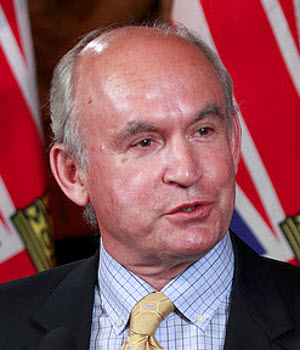
An NDP critic accused the core review minister Bill Bennett of lying about consultation on changes to the Agricultural Land Reserve, but a ministry official puts the matter down to miscommunication.
During debate of his ministry's budget last week, Bennett seemed to suggest the government had access to notes the chair of the Agricultural Land Commission, Richard Bullock, made during a 2010 public consultation about the ALR.
"The consultation done by the chair of the commission ... resulted in apparently hundreds of pages of notes and ... those notes were gone through with a fine tooth comb," Bennett said on May 13, according to the Hansard transcription.
"It was a pretty broad consultation that the chair did," he said. "There were a lot of notes that were taken and, of course, he completed his report. I do know that the former minister had his staff go through all of those notes and organized the comments relating to the ALC that were received there."
When Shane Simpson, the NDP critic for the core review, later asked a question that mentioned Bennett saying the government had documents from Bullock, Bennett didn't contradict him. Instead Bennett said, "I have already answered that question four times."
'Gov't caught in a lie': Popham
The government is in the middle of debating changes to the ALR, the largest of which would divide the province into two zones with reduced protection for farm land in the Kootenay, North and Interior regions. The three regions include 90 percent of the land in the ALR.
Under the changes, decisions on whether to allow ALR land to be used for things other than farming would be made by local panels and would take social and economic factors into consideration, though ministers have said the ultimate goal will remain supporting farms and farmers.
The suggestion the government had Bullock's notes was surprising to Bullock. "I don't think they had my notes," he said in a phone interview. "I don't know where they [would have] got them from, because they don't. What they have is my report."
He also said the changes the government is making don't resemble what he recommended in that 2010 report. "I'm not sure I recognize anything," Bullock said of the legislation. "What they decide to do they decide to do and that's not my decision. Take that for what it's worth."
Lana Popham, the NDP's critic for small business, tourism, arts and culture, said Bennett had misrepresented the government's record of consultation.
"The government's been caught in a lie," she said, adding Bennett shouldn't claim the government has access to notes that it did not. "That's a complete lie. This government should go back to the drawing board. This bill should not be allowed to pass."
Popham said she would raise a point of order in the house and ask for Bennett's comment to be withdrawn.
Same meeting, different conclusion
Bennett was away from the legislature at the end of last week and a ministry official said the minister was out of the province and unavailable to talk on the phone.
Energy ministry spokesperson Matt Gordon provided an emailed statement explaining that the government had its own notes from Bullock's review.
"In 2010 an ALC review committee travelled the province getting input from 300 individuals and 60 stakeholder organizations, which fed into the Chair's final 100+ page report," he said.
"Ministry staff were also in attendance in those 2010 meetings and compiled their own notes."
Reached by phone, Popham said the explanation seems to contradict what Bennett said during the debate. "That's not what he said," she said. "He said they were Richard's [Bullock] notes."
Even accepting the ministry's explanation, it's odd that the government's representative would attend the same consultation meetings but reach the opposite conclusion from Bullock, she said. "I don't think Bill 24 reflects those discussions, which he tries to imply it does," she said.
"The minister likes to leave the impression the chair of the Agricultural Land Commission was consulted and would have supported the changes they're making," she said. "I believe that's untrue. In my view the chair does not support the changes."
Bullock said he's watching the progress of the legislation intently and that it will greatly affect what the ALC does. He said he has tried to avoid getting drawn into the public debate, but that his views are clear in his report and his messages from the chair, the most recent of which was released in March.
The 13-page March message said "each and every region of British Columbia has prime agricultural land based on agricultural capability classifications and agriculturally suitable lands for specialty crops, forage, extensive agricultural uses and non-soil bound agricultural endeavors."
It made clear that boundary adjustments were ongoing and made based on scientific and technical information. The north, in particular, would be important for agriculture "several generations in the future" as development pressure would likely be focussed in the southwest of the province, it said.
"My position is pretty darn clear and it's well thought out, I thought," Bullock said on the phone. "I hope someone's reading it on both sides of the issue." ![]()
Read more: BC Politics















Tyee Commenting Guidelines
Comments that violate guidelines risk being deleted, and violations may result in a temporary or permanent user ban. Maintain the spirit of good conversation to stay in the discussion.
*Please note The Tyee is not a forum for spreading misinformation about COVID-19, denying its existence or minimizing its risk to public health.
Do:
Do not: